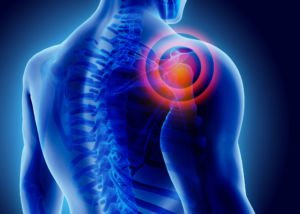What is Frozen Shoulder?
Frozen shoulder is a painful condition that is also known as adhesive capsulitis. With frozen shoulder, your shoulder joint is extremely painful and stiff, which can result in a limited range of motion that can affect your daily activities and overall quality of life.

To better understand the condition, let’s take a closer look at the anatomy of the shoulder:
Shoulder Anatomy
- Your upper arm bone is your humerus
- Your shoulder blade is your scapula
- Your collarbone is your clavicle
The head of the humerus fits into an open space in the scapula, creating a ball and socket joint. This joint, as well as your rotator cuff tendons, are surrounded by a strong connective tissue that is known as the shoulder capsule. There is also fluid present in the shoulder to help lubricate the capsule and joint so your shoulder can move.
If the shoulder capsule thickens and tightens, frozen shoulder develops. Adhesions (stiff bands of tissue) also develop and often there is less fluid available to lubricate the joint.

Symptoms of Frozen Shoulder
The overall symptoms of frozen shoulder include pain and stiffness, as well as a declining ability to move your shoulder. This pain can last up to several years with symptoms being divided into three stages:
Freezing Stage
- Pain develops when you move your shoulder and gets worse over time.
- You’re limited in how much and how far you can move your shoulder.
- This stage lasts around 6 to 9 months.
Frozen Stage
- Moving the shoulder becomes more difficult.
- Completing daily activities becomes harder.
- The pain may dull but the stiffness gets worse.
- This stage can last around 4 to 12 months.
Thawing Stage
- Your range of motion begins to go back to normal.
- This stage can take around 6 months to 2 years.
Causes of Frozen Shoulder
While the exact causes of frozen shoulder aren’t well known, there are a few factors that have been shown to put you at a higher risk of developing the condition:
- If the shoulder has been immobile for a long period of time. This can be common after recovering from arm surgery.
- Certain medical conditions like diabetes, Parkinson’s disease, hyperthyroidism and cardiac disease.
Frozen Shoulder Treatment Options
Frozen shoulder improves with time, but in many patients it can take up to several years to heal on its own. However, there are many options available to control pain and help restore range of motion.
Nonsurgical Options
- Aspirin and ibuprofen can help reduce pain and swelling.
- Cortisone (steroids) can be injected right into the shoulder joint for direct anti-inflammatory relief.
- Physical therapy, including stretching and range of motion exercises, can help restore mobility.
Surgical Options
If nonsurgical treatment fails, there are surgical options to relieve your symptoms:
- Arthroscopic Shoulder Surgery
With arthroscopic surgery, an orthopaedic surgeon cuts through the tight sections of your joint capsule, which can provide relief. - Shoulder Manipulation
An orthopaedic surgeon can also perform a manipulation under anesthesia, where you are put to sleep and the surgeon forces your arm to move. This helps the capsule and scar tissue stretch and tear, and can help increase your range of motion.
If frozen shoulder surgery is performed, physical therapy during recovery will be crucial to maintain your range of motion.
